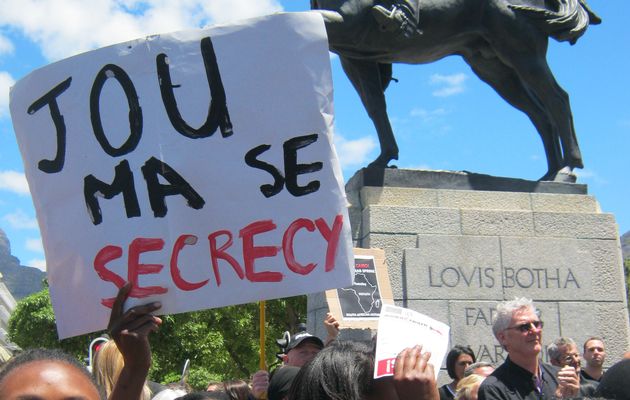“We are seeing more secrecy and less access to information.” So says activist, Murray Hunter, summing up the 2014 ‘Secret State of the Nation’ report released by the Right2Know Campaign on Wednesday. The annual report is a snapshot study of trends, patterns and challenges with secrecy in South Africa.
“One of the things we found was that when civil society bodies approach government [using the law] for information, only 16% of the time do we get a response. That has dropped over the last two years. And it’s not a good thing,” said Hunter.
The report’s key findings include several signs of abuse of secrecy and continued securitisation of some parts of the state.
• Increasing limitations on protest, with a sharp increase in attacks on protesters: there is a general upward trend in the number of protesters killed by police, and complaints of assault and attempted murder by police.
• Continued increase of the use of state-security policies such as the National Key Points and Strategic Installations with no public oversight.
• Lack of public oversight of surveillance capacity which remains vulnerable to abuse.
• Signs that secrecy and security-state capacity are being used to shield political actors from embarrassment and scrutiny, in particular the office of the Presidency and President Zuma himself.
At the same time, R2K looked at continued shortcomings in existing transparency mechanisms:
• Existing research shows that access to information mechanisms are failing: the most recent monitoring report of the PAIA Civil Society showed that only 16% of requests resulted in full release of information. This is the lowest success rate since monitoring began in 2009.
• There is too little proactive release of information.
• The transparency mechanisms of the private sector continue to be overlooked. In this report we examine case studies of transparency struggles involving the extractive industries.
“In almost every instance where you see corruption in government, there is almost always a private sector involvement. So it’s important that the public holds the private sector to account,” said Hunter.
“Within the mining sector, for example, communities are asking these industries for information showing the impact their work has on the environment. The majority of the time, these individuals are blocked, shut down and threatened with lawyers’ letters. So we can see the private sector is undermining the public’s right to know.”
Hunter said it was worth noting that the report has been hampered by lack of access to information. He added that “many of the metrics of secrecy, which would help inform a public debate on these issues, remain secret”.
The report is available for download at http://www.r2k.org.za/2014/09/09/r2k-secrecy-report-2014/. VOC






 WhatsApp us
WhatsApp us 

